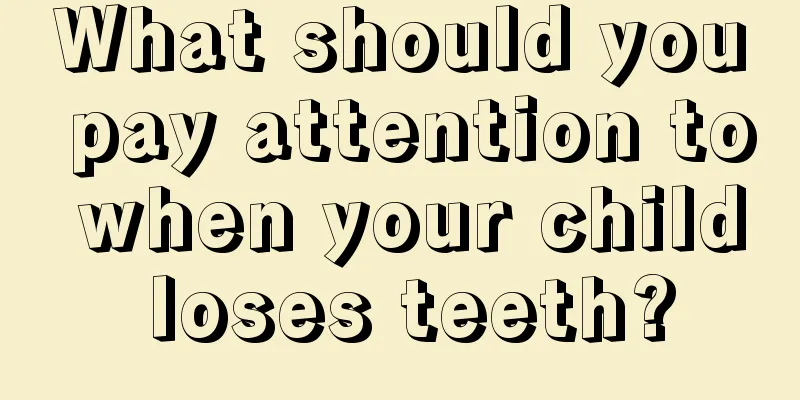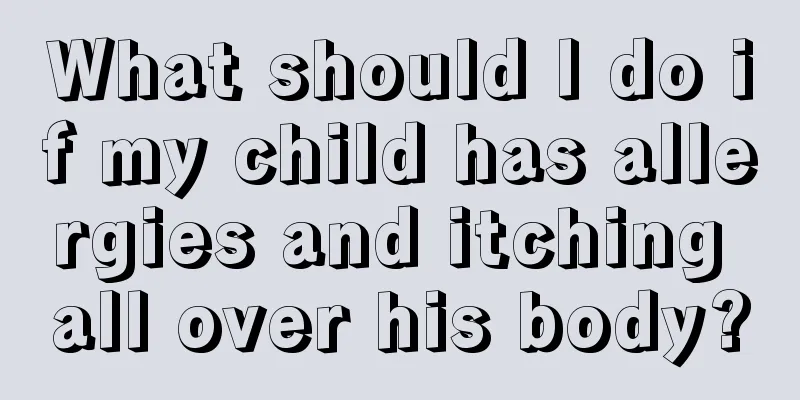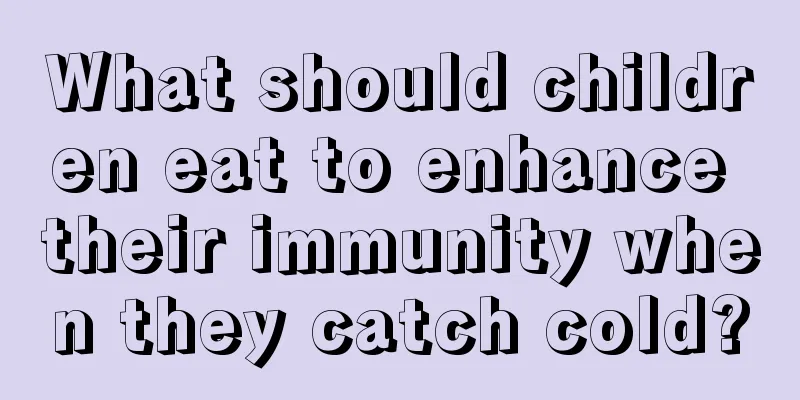What should you pay attention to when your child loses teeth?

|
We all know that teeth are used to chew food. Once there is a problem with the teeth, it always brings us severe pain and affects our normal diet. However, many babies always have problems with their teeth because they like to eat sweets. But when the baby is about 6 years old, they will start to change their teeth. During this period, special attention must be paid to ensure that the baby grows healthier teeth. Let's take a look at what we need to pay attention to when children change their teeth. What should you pay attention to when your child loses teeth? 1. Always pay attention to the growth of your baby's deciduous teeth and permanent teeth, and take your baby to the dentist regularly so that problems can be discovered at any time and resolved early. 2. Encourage your baby to brush his teeth every day. It is best for an adult to help brush his teeth before going to bed at night, especially since the double rows of teeth are more difficult to clean and are most likely to cause tooth decay. The six-year molars are also not easy to brush because they are located at the innermost part of the mouth. You should use toothpaste and toothbrush specially designed for children. The toothbrush head should be as small as possible, otherwise the baby will vomit easily when you reach the innermost part. In addition to brushing teeth, it is best for your baby to rinse his mouth after each meal to maintain oral hygiene. 3. During the period of teeth replacement, babies should eat more foods that are high in fiber and have a certain degree of hardness, such as fruits, carrots, beans, corn, etc., to maintain a good stimulation to the deciduous teeth and promote the shedding of deciduous teeth on time. On the other hand, it also helps to stimulate the facial and eye muscles through chewing movements, accelerate blood circulation, and promote the development of gums, jaws and facial bones, which is both healthy and beautiful. This is not only applicable to babies. I wonder if you have noticed that with the improvement of living standards, the food we eat is becoming more and more refined, which is actually not good for the health of teeth. The degeneration of wisdom teeth (also called third molars) is an example. Therefore, we need to eat some hard and wear-resistant foods from time to time to allow the teeth, mouth and surrounding muscles to get proper exercise. 4. To enhance the baby's calcium absorption, encourage the baby to eat more foods high in calcium, such as milk, cheese, tofu, canned fish, etc. At the same time, the baby should take enough vitamin C and D, because these two vitamins are helpful for calcium absorption. 5. Try to avoid your baby breathing through the mouth when sleeping (usually due to enlarged tonsils or nasal diseases that cause nasal breathing difficulties). This is because when the air flows through the mouth, the upper palate is subjected to upward pressure and cannot develop downward normally, causing the upper palate to bulge upward, and the left and right sides of the upper dental arch become narrower, with the front part protruding forward. As a result, the erupted incisors are not only tilted forward, but also misaligned, forming gaps in the teeth. 6. Correct your baby’s bad habits in time, such as sticking out or biting the tongue, biting fingers or pencils, licking teeth with the tongue, etc. These bad habits will affect the growth of your baby’s teeth and cause tooth deformation. ? 7. Special protection should be given to the first permanent molar that grows out when the baby is about 6 years old - the sixth molar, because it has the function of positioning and determining the height of the teeth in the entire mouth, has a great influence on the development of the baby's jaw and face, and plays an important role in the eruption and arrangement of other permanent teeth. 8. Provide safety education to your baby regularly and try to prevent tooth loss due to trauma. The above is an introduction to what we need to pay attention to when children are losing their teeth. After understanding it, we must pay attention to it during the period of children's tooth replacement. We must pay attention to maintaining good oral hygiene during the period of tooth replacement, and try to avoid eating sweets during the period of tooth replacement. Let the children have a sense of safety to avoid accidents such as teeth being knocked out, and pay attention to feeding the baby high-calcium foods during the period of tooth replacement. |
<<: Why do two-year-olds have yellow teeth?
>>: What to do if your child loses a tooth and bleeds
Recommend
Why is the newborn losing weight?
There are pathological and physiological reasons ...
What is myocarditis in children?
Myocarditis is a common heart disease that is not...
Will children mature early if they drink honey?
It has always been believed that children drinkin...
What to do if your child keeps coughing and vomiting
Cough is one of the most common symptoms of influ...
Baby autumn and winter skin care
The skin of infants and young children also needs...
When can you cut a newborn's nails?
Newborns have nails at birth, because nails are a...
What are the symptoms of poor development in babies?
Many children have been malnourished since birth....
Calcium supplement recipes for 3-year-old children
The growth stage of babies cannot be separated fr...
What to do if your baby has a runny nose and cough
As a mother, you should know how to treat the run...
What should I do if my child always suffers from insomnia?
I believe everyone knows that sleep is one of the...
What should I do if my child suddenly develops red bumps on his body?
If a child develops red bumps on his body, it is ...
What causes a child to have a fever, cough, and runny nose?
The phenomenon of babies having fever, cough and ...
What should I do if my four-month-old baby has dry and peeling skin in winter?
Winter is coming and the weather is getting colde...
What happens when a child's new teeth grow out but the old teeth do not fall out?
The most impressive thing about children in the p...
What are the symptoms of milk allergy in children?
Children are in a critical period of physical dev...









